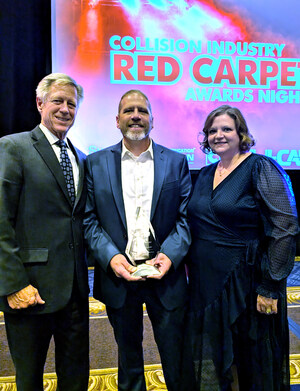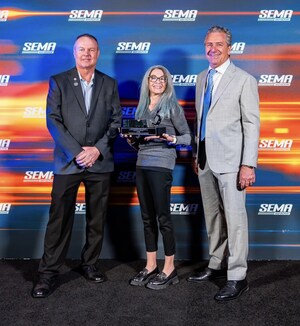Connected Cars, New Materials To Radically Change Collision Repair, Auto Leaders Tell I-CAR® Conference
INDUSTRY EXECUTIVES LEARN HOW EVOLVING TECHNOLOGIES AND FUEL-ECONOMY RULES WILL CHANGE COLLISION REPAIR REQUIREMENTS AND TECHNIQUES
DETROIT, July 30, 2014 /PRNewswire/ -- Connected vehicles and tough new fuel-economy regulations rapidly are transforming the basic DNA of the world's cars and trucks, and that means collision-repair professionals soon will find their jobs much more demanding, requiring more know-how and entailing more complexity, according to auto industry leaders addressing more than 300 collision-repair executives today at Detroit's Cobo Center.
The Inter-Industry Conference on Auto Collision Repair (I-CAR®), organized the Conference to discuss the "technical tsunami" that is approaching the industry and how technological advancements will transform collision repair techniques for tomorrow's vehicles. Ten presenters brought executives up-to-date on new materials, new technologies and new approaches to transportation that will impact their collision repair businesses.
I-CAR continues to evolve its training and communications program for collision repair professionals in response to these technological changes. I-CAR CEO and President John S. Van Alstyne told the executives, "We have continuously met change by developing more relevant training and increasing accessibility through an expanded set of curriculum delivery methods, designed to build a learning culture that maximizes the ROI of training. We are positioned to help the industry address new technologies, materials, and outputs from demands from legislation such as CAFE and consumer-focused advancements in vehicle communications and safety."
New Applications of Materials
Offering an example of how materials technology already is affecting repair, Ford Motor Company Vice President of Powertrain Engineering Bob Fascetti furnished insights on the new aluminum-intensive F-150 truck. The vehicle employs high-strength, military-grade aluminum alloy along with high-strength steel.
"The all-new Ford F-150 will redefine the light-duty pickup segment, and we're thrilled to share its story with the I-CAR community," Fascetti said. "In addition to details on its remarkable new engines and class-exclusive features, we know the service and collision industry is eager to learn about the 2015 F-150's new design for repairability, as well as recommended tools and training for repairing its new military-grade, high-strength aluminum alloy body."
Alcoa Marketing Director for Automotive Sheet Randall Scheps said the new F-150 "is the biggest news for aluminum in decades and just the beginning of a long-term trend to aluminum car bodies." He noted that a shift to aluminum among automakers is accelerating, because aluminum saves up to 28 percent more weight than steel and can improve fuel economy by up to 4.8 mpg.
"According to the Aluminum Association, 85 percent of hoods will switch to aluminum by 2025 and 18 percent of all car bodies will be aluminum by that year, up from less than 1 percent today," Scheps told the conference participants, noting that Alcoa 951 bonding technology is a critical part of the transition from steel to aluminum.
As a result, body shops will need to adapt to a much greater proportion of repairs involving aluminum. "Among the critical success factors for these shops," Scheps said, "will be shop hygiene, isolating aluminum from steel, dedicated work areas and tools and training."
The Changing DNA of Vehicles
University of Michigan Professor of Engineering Practice Larry Burns, who for 11 years was vice president of R&D and Planning for General Motors, provided conference participants a transformational look into the very near future of automotive technology.
Burns indicated that the genetics of vehicles is changing dramatically, from cars with mechanical drive, combustion engines, oil-based fuels and human operation to a new DNA characterized by electrical drive and motors, diverse energy sources, connected and coordinated vehicles and driverless technology. Increasingly, he observed, vehicles will become more connected, coordinated, shared and self-driving.
"It's really important for the collision-repair industry to speak to the change, to know what the industry should be anticipating and responding to," Burns advised. For instance, he expects lower demand for repairs as the number and severity of crashes decrease. At the same time, however, collision repair will become more complex, dealing with more types of technology, materials, fastening systems and vehicle types. Collision repair organizations will require a greater capability, with more know-how, equipment and information systems to serve more demanding vehicle owners and business partners.
Further, Burns predicted, connected and coordinated vehicles and tailored design will change not only the technology but also the business model "with how goods and people move around and how people live their lives with regard to connectivity."
He said the added cost of new technologies and compliance with regulations will provide a real motivation to extend the life of cars, "not just repairing cars in a crash, but setting up the business for how to take a car that's reached the end of its life in 10 years and remanufacture the cars to get another five to 10 years of life."
"To quickly improve fuel economy and production," Burns said, "we'll have many more initiatives—like the Ford F-150—that will affect the collision repair industry in a big way."
About the 2014 I-CAR Conference
The 2014 I-CAR Conference, themed "Driving Excellence in Technology" and held at Cobo Center in Detroit, Michigan, brought hundreds of executives together with leading auto industry figures to detail the challenges and opportunities related to rapidly advancing automotive technologies and their impact on the collision repair industry. The July 30 conference offered extensive opportunities for networking, discussion and learning. For more information, visit the I-CAR Conference website.
Founded in 1979, I-CAR is a not-for-profit education, knowledge, and solutions organization designed to support the evolving needs of the Collision Repair Inter-Industry. I-CAR is focused on improving the quality and safety of auto collision repair for the ultimate benefit of both the industry and the consumer. www.i-car.com.
SOURCE I-CAR
WANT YOUR COMPANY'S NEWS FEATURED ON PRNEWSWIRE.COM?
Newsrooms &
Influencers
Digital Media
Outlets
Journalists
Opted In






Share this article